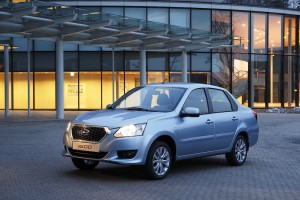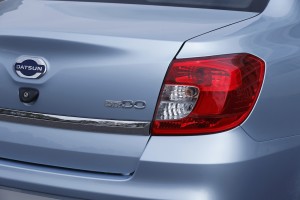
The Datsun on-DO is the brand's first offering in Russia. It is a four-door, five-seat family sedan.
Despite a slowdown and sales, cuts in production and the political crisis in the Ukraine, global automakers are still moving ahead with plans to expand in Russia, which could become Europe’s largest single market before the end of the decade.
Russian sales dropped 5% last year and are expected to shrink further this year despite the pent up demand for new vehicles in European Russia. At the same, though, Nissan has moved forward with sales in Russia of its Datsun brand, which is aimed at the lower range of the market.
Global automakers appear to be willing to look beyond Russia’s role in the messy political upheaval in the Ukraine as they continue to expand in Russia, which is expected to emerge as the largest automotive market in Europe well before the end of the decade.
The Ford Sollers joint venture outside St. Petersburg has reduced production, idling some 700 employees. The layoffs by Ford Sollers were blamed on a slowdown in the Russian economy. However, Nissan is taking a different tack by using the Datsun nameplate to expand its foothold in markets such as India and Russia.
Nissan revived the Datsun name last year as the brand for a line-up of low-priced, economy vehicles it planned to market in Asia, Europe and, down the road, other regions. Carlos Ghosn, chief executive officer of Renault and Nissan, visited Moscow last week to help the Datsun brand kick off sales in Russia.
“Today, Russia is our company’s fifth largest market in the world. In the next three years, we are aiming to triple our sales here – with the goal of doubling market share and we expect the Datsun brand to contribute as much as one third of total sales.”
Ghosn also expects the diplomatic and political tensions between Russia and the United States and European Union to fade over time. Nissan has invested more than $1 billion in its Russian venture since 2007.
The Russian launch of Datsun will draw on Nissan’s 80 years of manufacturing and technical expertise – and by leveraging the engineering skills, market knowledge, and production capabilities of our Alliance partner, AVTOVAZ, which is one of Russia’s largest auto companies.
The Datsun on-DO is the brand’s first offering in Russia. It is a four-door, five-seat roomy family sedan.
(GM beginning ignition switch repairs. For more, Click Here.)
Ghosn’s remarks echo those of Fiat Chrysler Automobiles chief executive officer Sergio Marchionne, who also said that he doubted the current political crisis will have any lasting impact on the investment in Russia by the world’s top automakers.
Marchonne said last month during a visit to a Chrysler plant outside Detroit that he does not believe the crisis in the Ukraine will have any “spillover” effects on the European economy or Fiat Chrysler’s investment in Russia where it is preparing to build Jeeps with a Russian partner. “It’s an unfortunate set of circumstances,” said Marchionne. “It should be resolved diplomatically.”
(Click Here to details on how the Ukraine crisis could hurt the Russian auto industry.)
The dispute should have no impact on commerce, he said. He also noted that Russia was strategically important to FCA.
(To see Nissan’s “glocal” growth strategy for Datsun, Click Here.)
German automakers, BMW, Daimler AG and Volkswagen AG, also have invested heavily in Russia recent years with the encouragement of Russian Premier Vladimir Putin, who has advocated policies aimed at overhauling and modernizing Russia’s automotive production capacity.
General Motors, the largest American car company which has focused on expanding its business in China over the past two decades, also expanded into Russia and last year designated Opel as the lead brand for further moves into the Russian market.

